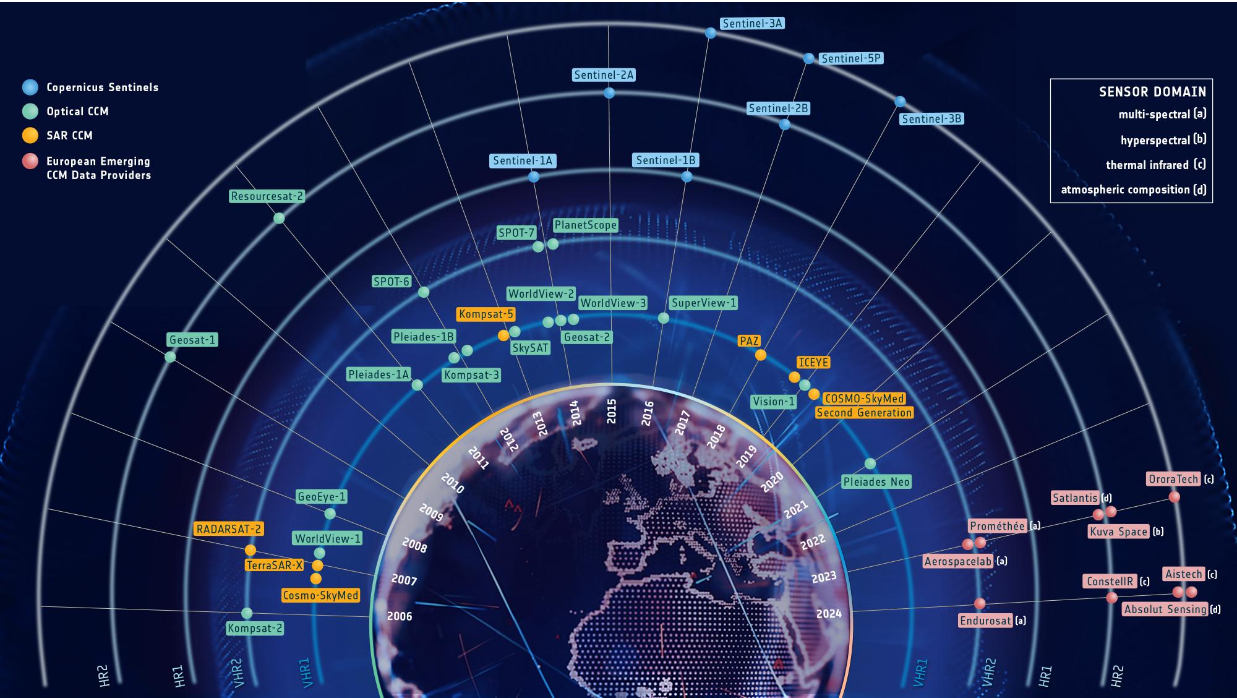As we all face the consequences of climate change and strive to ‘do things better’, accurate information about our planet has never been more important.
 Copernicus Contributing Missions overview. Image Credit: ESA
Copernicus Contributing Missions overview. Image Credit: ESA
Copernicus, now 25 years old, is the biggest environmental programme in the world, providing terabytes of free and open satellite data and information services to hundreds of thousands of users every day.
In doing so, the programme adds to long-term datasets to monitor major challenges such as diminishing polar ice, sea-level rise, drought, and more.
The programme, and its satellite missions, is hugely important for evidence-based decision-making, not only to address climate change, but also to optimise business practices in their efforts to be more sustainable and to make those business practices more profitable in the process.
While the suite of Sentinel satellite missions that ESA develops and builds, and in many cases operates, are central to the Copernicus programme, there are other commercial satellite missions – the Copernicus Contributing Missions – that play a crucial role in delivering complementary Earth observation data to answer to the data needs of the Copernicus Services and the needs of public authorities.
There are currently more than 20 privately-owned satellite missions that contribute to Copernicus. And, with the contracts that ESA signed recently on behalf of the European Commission, nine different European New Space companies are added to the list.
Although Copernicus is hugely successful, the aim of bringing emerging European New Space companies into Copernicus is to help keep the programme ahead of the game in the rapidly changing sector of observing Earth from space.
ESA’s responsibility includes coordinating the Copernicus Contributing Mission activities as part of the programme.
ESA’s Peggy Fischer, who is responsible for managing the Copernicus Contributing Missions programme, said, “The team is very excited to start work with these nine emerging European data providers. It will be first time that Earth observation data from emerging European New Space companies will be made available to Copernicus users in different data domains.”
The companies in question are: Aerospacelab in Belgium, Prométhée in France and EnduroSat in Bulgaria to supply multispectral images from their different satellite constellations; Kuva Space Oy in Finland to supply hyperspectral images; constellr in Germany, OroraTech also in Germany and Aistech in Spain to provide thermal infrared data from their satellite missions; and Satlantis in Spain and Absolut Sensing in France to provide data on atmospheric composition.
Once the companies have their missions in orbit, the data will complement that of the Sentinel missions by providing information about changing land, oceans and atmosphere.
Celebrating the inclusion of these companies in the Copernicus programme, ESA’s Director of Earth Observation Programmes, Simonetta Cheli, said, “I would like to warmly congratulate the nine companies joining the growing Copernicus Contributing Missions programme.
“This is a testimonial of the agility and continuous evolution of Copernicus, the importance of onboarding commercial missions, and a vote of confidence for European Earth Observation New Space.”
The nine companies are set to start an onboarding process at a workshop being held shortly at ESA’s establishment in Frascati, Italy.